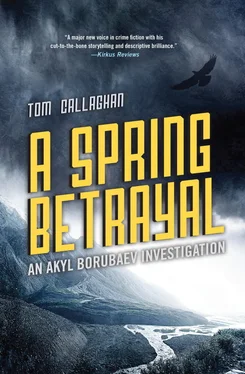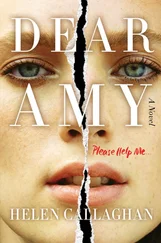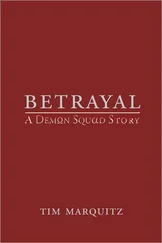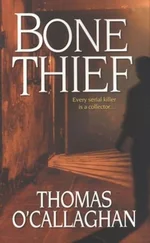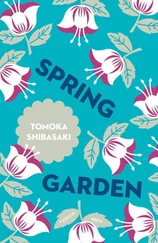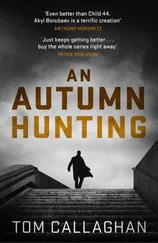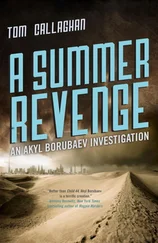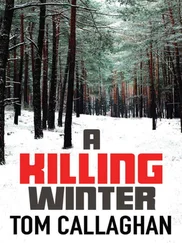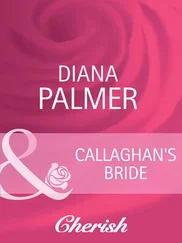“Just what is it you want, Albina?” I asked.
“Well, I’d appreciate knowing where I can put my hands on Ms. Umarova, for a start.”
“I don’t know where she is,” I said, glad Saltanat and I hadn’t arranged to meet at the apartment. “And I don’t see how finding her helps you, to be honest. There’s too much information out there now, about you, about Graves.”
She simply laughed.
“You’d be surprised at how little people hear when you stuff their ears with som , Inspector. Everyone looks the other way for the right price.”
“You’re asking me to betray her?”
“I’m asking you to save yourself a lot of unnecessary anguish. If she were here now, strapped next to you, maybe even holding your hand in some sickly sentimental pact, whose eye would you rather I took out? Hers or yours?”
I was silent. Kurmanalieva stood in front of me, blew a cloud of smoke into my face, and smiled. But it was more like a grimace than a smile, making her look both human and insane.
“I rest my case, Inspector,” she said, inspecting the glowing tip of her cigarette as if solving a puzzle, before stubbing it out on my left hand, the one with the scar tissue I’d acquired during the Tynaliev affair. A lot of the nerves in my hand had been damaged and the scars were thick enough to lessen the pain, but it was still enough to make me cry out.
Kurmanalieva threw the butt onto the floor, grinding it out with her shoe. Elegant scarlet stilettos, I noticed. If I was going to be tortured, it might as well be done with style. She reached up again toward my face, my eye, and smiled as I flinched. She patted my cheek, and her fingernail scratched against the stubble on my jaw. I felt beads of sweat slide down my back.
“Back in the good old days of the USSR,” she said, “I was seconded to the Lubyanka in Moscow for two years. The Kremlin was keen to ensure its distant territories stayed loyal, or at least quiet. So it made sense to have some Central Asians batting for the team.”
As she spoke, she walked toward the shelves with the knives, hooks, and whips, testing the point of a boning knife with her fingertip, running her thumb against the edge of a narrow blade, choosing how to inflict pain. She hesitated, selected a pair of pliers, old and rusted.
“I imagine you’re thinking ‘Traitor,’ or some such nonsense,” she said, her back toward me, so I was unable to read her expression. “But times were different. The Russians offered stability, peace. Casualties? There always are. But the people who bleat about democracy are always the ones with a passport and money for a ticket out.”
She turned back toward me, stood in front of me, her eyes drilling into mine.
“No comment, Inspector?” she asked. “You spent a few years in an orphanage, you know how turbulent things were then.”
I said nothing, unwilling to provoke her, to risk further pain.
“Did you know the Lubyanka was originally the headquarters of an insurance company?”
She laughed, that horrible false laugh again, charming as a scar.
“If you think about it, in one way, that’s what it stayed as. Insurance for the elite, for the country.”
She shrugged, resumed pacing around the room.
“I learned the virtues of patience. Rush in too quickly with the pliers or the electricity and you either kill your subject or they defy you, tell you nothing. The way I work, you’ll tell me everything, I’ll be a mother confessor to you. Your words spilling out, tripping over your tongue, unstoppable.”
I remained silent, shut my eyes, wished I could do the same for my ears. The awful thing was I knew she was right. I’d talk, sooner or later. Her voice continued, cajoling, wanting me to see her point of view.
“Normally, I’d take my time. Mix a little pain with a lot of sympathy and understanding. I don’t want to do this, any more than you want me to. But what choice do you give me?”
I bit the inside of my cheek, focusing on the pain rather than her hypnotic voice. A standard anti-interrogation technique, only a matter of time before I broke. Hours, days, weeks; none of it matters if you’re dreading the next few minutes.
“As I recall, you didn’t say anything the last time we met. Or don’t you remember?”
I remembered her perfume, the scent of dying lilies, the curve of her breasts, the cruelty in her eyes. The woman in the orphanage. I’d sensed her malevolence even then.
Without warning, Kurmanalieva knelt down and took hold of my foot. I tried to pull away, but the leather straps held me firmly in place.
“Ticklish?” she asked, drawing her fingernail lightly across the sole of my foot. She looked up at me, winked, as if we were in some conspiracy together.
I watched as she held up the pliers.
“Haven’t used these for a while,” she said brightly, snapping the jaws open and closed, open and closed. “I do hope I haven’t lost the knack.”
She placed the pliers against my little toe, and squeezed, just hard enough for me to feel the cold steel.
“Start off small, that’s always been my motto,” she said, cheerful, as if giving a toast at a birthday celebration. “The trick is not to damage the root bed; that way, your toenail grows back. Eventually. Of course, there’s a certain amount of initial discomfort, live and learn, eh?”
The last thing I wanted was a lesson in anatomy, but I could only listen.
“The nail plate, the bit you trim, that’s just dead, compacted cells, the stuff that rhino horns are made of. But underneath, at the back, that’s the matrix, the living tissue that grows the nail. Very sensitive.”
And with that, she jerked her arm back.
A bolt of white fire screamed up my left leg, turning me sightless for a few seconds.
I opened my eyes, wondering if I’d pissed myself, looked at my torturer. Kurmanalieva held up the pliers, my bloodstained toenail trapped in their jaws.
“There, all done, that wasn’t so bad, was it?” she asked, in a terrible parody of maternal feeling, as if taking a splinter out of my finger or cleaning a cut on my knee.
“Just be glad it wasn’t your big toe, that really does hurt. Or so I’ve seen.”
She held the pliers close to my face. I could smell the blood, see the gleam in her eyes. I managed not to vomit, although messing up her designer suit was a temptation.
“It’s not the sort of wound you can put a bandage on, but as long as you keep it clean and dry, the nail will grow back, and you’ll be fine in eighteen months.”
Kurmanalieva reached into her bag, took out her cigarettes, lit one, placed it between my lips. I inhaled, dizzy as the smoke filled my lungs. She looked down at my foot, a worried expression carving lines in her forehead. She looked at the lit tip of her cigarette, and softly blew on it, until it flamed a rich orange.
“I don’t think you can keep your toe clean and dry, Akyl, not being tied up and in this damp cellar. So it’s probably best if I cauterize the wound.”
She knelt down again, and with a single stabbing movement, stubbed her cigarette out on the bare raw flesh where my nail had been.
This time, I fainted.
When I came round, Kurmanalieva was scrubbing the pliers clean with a cloth she soaked from an unlabeled bottle.
“Vodka,” she explained. “I keep things hygienic. No point in questioning people if they’re going to die from blood poisoning first.”
She held the bottle up in front of me, raised one eyebrow, held the thumb and forefinger of her other hand a couple of centimeters apart.
“Just a small one, raise the spirits, loosen the tongue? Oh, of course, you don’t drink, do you?”
She turned away, then splashed some of the clear liquid over my bare foot. I didn’t pass out, but I did vomit. Unfortunately, only on myself. Music suddenly filled the cellar. “Dies Irae,” the “Day of Wrath,” played in the cheap tinny tones of a mobile phone. Kurmanalieva rummaged in her bag, produced a smartphone, turned away to take the call. She listened without speaking for a moment, then spoke.
Читать дальше
